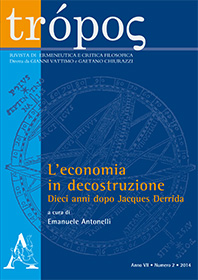Estratto da
TRóPOS
L’economia in decostruzione. Dieci anni dopo Jacques Derrida
Abramo e il capitalismo: promesse e sacrifici
TRóPOS
L’economia in decostruzione. Dieci anni dopo Jacques Derrida
Abramo e il capitalismo: promesse e sacrifici

Abstract
«I could think of another Abraham for myself». This is the heart of the Derrida’s economic thought. Abraham is the symbolon of the oikonomico. His work is particularly relevant for understanding financial capitalism, because financial markets are based on the relationship between debts and credits and on the promise to pay in time–lag: khôra becomes the tópos of finance. Abraham’s narrative is the paradox of the economy of reward: God donates future time to Isaac. In financial markets, borrowers (payers) ask for time to creditors and they make up time–objects in order to extend credits. The wordly gift is a substitute for the monetary economic exchange, which fails to take account of~gift’s responsibility.~It is an aporetic event when it is combined with the notion of the economic ego. Insofar as Derrida’s gift is defined in contrast with objects of economic reciprocity, it must appear without any connection to the cycle of imbursement and reimbursement. Only the aneconomic gift of time transcends all conceptualization, yet it underlies our more basic nature and it is aporetic because it closely intertwines the times: aion, kronos and kairos. In this point of view, Marx’s onto–eschatology is compromised by fetishism and its accompanying spectrality, because it tries to hypostasize absolute presence and preserve it from difference in order to pretend that alienation and otherness can be overcome, when in fact they cannot.
Keywords: capitalism, gift, temporality, financial markets, Aufhebung
«I could think of another Abraham for myself». This is the heart of the Derrida’s economic thought. Abraham is the symbolon of the oikonomico. His work is particularly relevant for understanding financial capitalism, because financial markets are based on the relationship between debts and credits and on the promise to pay in time–lag: khôra becomes the tópos of finance. Abraham’s narrative is the paradox of the economy of reward: God donates future time to Isaac. In financial markets, borrowers (payers) ask for time to creditors and they make up time–objects in order to extend credits. The wordly gift is a substitute for the monetary economic exchange, which fails to take account of~gift’s responsibility.~It is an aporetic event when it is combined with the notion of the economic ego. Insofar as Derrida’s gift is defined in contrast with objects of economic reciprocity, it must appear without any connection to the cycle of imbursement and reimbursement. Only the aneconomic gift of time transcends all conceptualization, yet it underlies our more basic nature and it is aporetic because it closely intertwines the times: aion, kronos and kairos. In this point of view, Marx’s onto–eschatology is compromised by fetishism and its accompanying spectrality, because it tries to hypostasize absolute presence and preserve it from difference in order to pretend that alienation and otherness can be overcome, when in fact they cannot.
Keywords: capitalism, gift, temporality, financial markets, Aufhebung
| pagine: | 113-134 |
| DOI: | 10.4399/97888548797208 |
| data pubblicazione: | Dicembre 2014 |
| editore: | Aracne |








